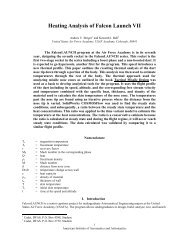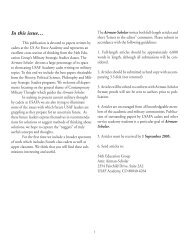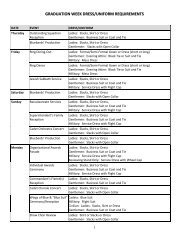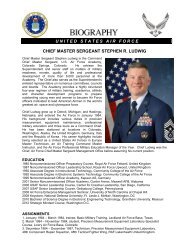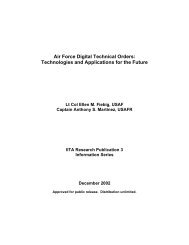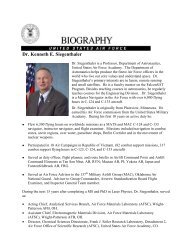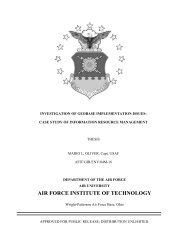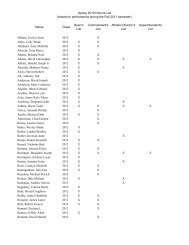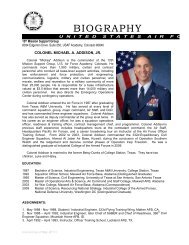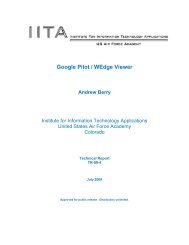the rollback of south africa's biological warfare program
the rollback of south africa's biological warfare program
the rollback of south africa's biological warfare program
Create successful ePaper yourself
Turn your PDF publications into a flip-book with our unique Google optimized e-Paper software.
Research Laboratories and Protechnik) were found to be involved in<br />
developing chemical and <strong>biological</strong> weapons. 149 In 1991, SADF counterintelligence<br />
began investigating Basson after security leaks. Finally, evidence<br />
was found that Basson’s team had armed RENAMO with chemical weapons.<br />
The Steyn team quickly investigated projects that needed to be stopped.<br />
However, financial misdealings were not examined. Investigations went<br />
smoothly, until <strong>the</strong> first report was completed and issued on 20 December<br />
1992 and landed on de Klerk’s desk at <strong>the</strong> beginning <strong>of</strong> January 1993. De<br />
Klerk was asked to take action, even though <strong>the</strong>re was no legal basis for<br />
action, no charges and no solid evidence. However, pre-emptive steps were<br />
necessary before a cover-up could be launched. De Klerk was presented with<br />
<strong>the</strong> counterintelligence evidence, which demonstrated that SADF secret<br />
<strong>program</strong>s ran against de Klerk’s stated policy <strong>of</strong> civilian control over <strong>the</strong><br />
military. However, de Klerk failed to ask SADF Chief <strong>of</strong> Staff Liebenberg and<br />
SAP head van der Merwe if <strong>the</strong>y knew about <strong>the</strong> illegal activities and, if <strong>the</strong>y<br />
did not, to act concertedly. Instead, de Klerk called in Liebenberg, Meiring and<br />
<strong>the</strong> SADF Chief <strong>of</strong> Intelligence and informed <strong>the</strong>m <strong>of</strong> <strong>the</strong> evidence.<br />
Liebenberg said he was “shocked” and would report back in 10 days.<br />
President de Klerk decided that firm and decisive action was needed,<br />
even though <strong>the</strong>re was no conclusive evidence. In mid-January 1993, de Klerk<br />
called Liebenberg in again and announced that he had changed his mind and<br />
that he wanted to act assertively. He would fire <strong>the</strong> generals responsible for <strong>the</strong><br />
CCB and o<strong>the</strong>r secret projects. De Klerk asked Liebenberg to ensure that <strong>the</strong><br />
SADF policed itself. Subsequently, de Klerk launched ano<strong>the</strong>r, more random<br />
investigation. Instead <strong>of</strong> acting against Liebenberg and van der Merwe, de<br />
Klerk let Liebenberg <strong>of</strong>f <strong>the</strong> hook, and Liebenberg was not obliged to report<br />
back. De Klerk did not even confront <strong>the</strong> SAP’s van der Merwe about <strong>the</strong><br />
activities <strong>of</strong> Eugene de Kock and <strong>the</strong> CCB unit <strong>of</strong> <strong>the</strong> SAP. As a result <strong>of</strong> <strong>the</strong><br />
second investigation, 27 generals retired early. Col. Dr. Basson was required to<br />
56




